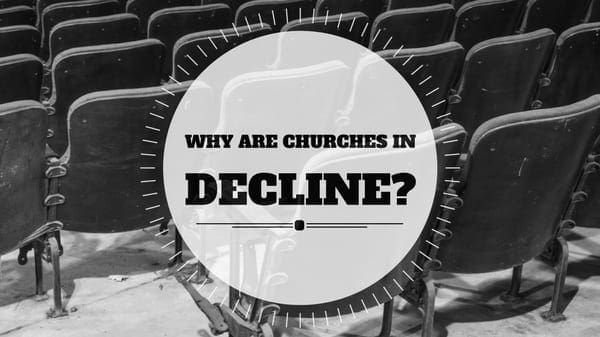This Is the Most Common Factor in Declining Churches

Why do all the stats tell us the church is in decline today?
I am honored and humbled to be in
a place where I get to hear from and study about thousands of churches.
The leaders and congregants in those churches provide me with
incredible information and data. I am grateful, because I’m not smart
enough to understand these issues on my own.
As God has allowed me to study congregations for more than 25 years, I began to see a common pattern in churches that had become outwardly focused. You can read some of the practical steps these churches have taken.

*There are very few attempts to minister to those in the community.
*Church business meetings become arguments over preferences and desires.
*Numbers of members in the congregation are openly critical of the pastor, other church staff and lay leaders in the church.
*Any change necessary to become a Great Commission church is met with anger and resistance.
*The past becomes the hero.
*Culture is seen as the enemy instead of an opportunity for believers to become salt and light.
*Pastors and other leaders in the church become discouraged and withdraw from effective leadership.
*If the churches are a part of a denomination or similar affiliation, meetings of those denominations mirror the churches in lost focus and divisiveness.
I have written in recent years about the dire straits of most of our churches. I have felt it necessary to do so in order to face the facts. Indeed, I wrote Autopsy of a Deceased Church about the deaths of many churches.
I don’t have my head in the sand. I know times are tough in many churches. I know congregations are dying every day. I know many church leaders are discouraged.
But we serve the God of hope.
Decline in our churches does not have to be a reality.
This post first appeared at ThomRainer.com.
As God has allowed me to study congregations for more than 25 years, I began to see a common pattern in churches that had become outwardly focused. You can read some of the practical steps these churches have taken.
THE MOST COMMON FACTOR
Conversely, though, I also can see a simple but profound pattern among the declining churches.Stated simply, the most common factor in declining churches is an inward focus.The ministries are only for the members. The budgetary funds are used almost exclusively to meet the needs of the members. The times of worship and worship styles are geared primarily for the members. Conflict takes place when members don’t get things their way. You get the picture.

WARNING SYMPTOMS
After studying and consulting with thousands of churches, I began to see clearly this pattern. Even more, I began to recognize symptoms of an inward focus. See if you recognize a few of these.*There are very few attempts to minister to those in the community.
*Church business meetings become arguments over preferences and desires.
*Numbers of members in the congregation are openly critical of the pastor, other church staff and lay leaders in the church.
*Any change necessary to become a Great Commission church is met with anger and resistance.
*The past becomes the hero.
*Culture is seen as the enemy instead of an opportunity for believers to become salt and light.
*Pastors and other leaders in the church become discouraged and withdraw from effective leadership.
*If the churches are a part of a denomination or similar affiliation, meetings of those denominations mirror the churches in lost focus and divisiveness.
THERE IS HOPE
For those of us in Christ, however, there is always hope—His hope.I have written in recent years about the dire straits of most of our churches. I have felt it necessary to do so in order to face the facts. Indeed, I wrote Autopsy of a Deceased Church about the deaths of many churches.
I don’t have my head in the sand. I know times are tough in many churches. I know congregations are dying every day. I know many church leaders are discouraged.
But we serve the God of hope.
Decline in our churches does not have to be a reality.
This post first appeared at ThomRainer.com.

No comments:
Post a Comment